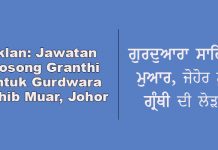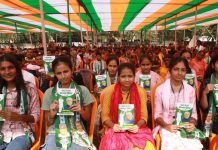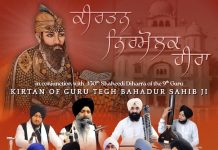
By Gurnam Singh | Opinion |
According to Sikh doctrine, to place food in the mouth of a hungry person is to serve the Divine itself (“ਗ਼ਰੀਬ ਦਾ ਮੁਹ, ਗੁਰੂ ਕੀ ਗੋਲਕ।”).
The most powerful material expression of this principle is the Langar, or free community kitchen, which stands as a defining institution of Sikh Gurdwaras across the world. Its most extraordinary manifestation is found at the Darbar Sahib in Amritsar, Punjab, where an estimated 100,000 people from all faiths and none are fed around the clock each day. The meal is always vegetarian, always free, and prepared entirely through voluntary labour and donations. It is service as devotion, and devotion as service.
On a far smaller scale, but in the same spirit, we recently held the second annual Langar on Campus at the University of Warwick, organised by the Sikh Society and supported by Langar Aid, an international NGO committed to serving the homeless, the vulnerable and those living in poverty across the UK. One might reasonably ask whether students and staff at a prestigious university are in need of food aid. But to frame Langar merely as the distribution of free food is to misunderstand its purpose entirely.
Although deeply embedded in Sikh tradition, Langar’s roots extend back into the Sufi traditions of Islam. The very word ‘Langar’ comes from Persian, meaning “anchor” or “resting place.” Historical sources show that free kitchens were maintained in Sufi centres, Khanqahs, as early as the 12th and 13th centuries. As Kathleen Seidel notes in her essay Serving the Guest: A Sufi Cookbook, travelling Sufis often relied on the hospitality of communities for shelter and sustenance. In response, networks of Khanqahs evolved into community kitchens and hostels offering food and refuge to all regardless of faith, background or status.
With the arrival of Guru Nanak in Punjab, this ethos was expanded and institutionalised. The foundational story of Sacha Sauda (“The True Bargain”) captures the heart of the Langar tradition. Given twenty rupees by his father to turn a profit, the young Nanak instead encountered a group of hungry sadhus. Convinced that feeding the hungry was the highest form of gain, he used all the money to buy, cook and serve them a complete meal. Returning home empty-handed, he explained that the true bargain was one that served humanity. In that moment, Guru Nanak replaced the logic of commerce with the logic of compassion, turning charity, equality and collective service into the central pillars of a new social vision.
Langar, then, is far more than a charitable meal. It is a living expression of an egalitarian, socially conscious and ecologically grounded worldview. It invites us to imagine and to practise a radically different social order in which food, dignity and community are not privileges but fundamental rights.
Imagine a world where Langar’s principles replace the logic of scarcity and competition, a world where equality is practiced daily at the food table. In this light, Langar becomes a practical utopian vision where the human right to food is actively implemented. Although Sikh teachings enshrined this principle in the 15th century, global recognition of the right to food only emerged in the mid-20th century, notably in the 1948 UDHR and later in the 1966 ICESCR.
Extending beyond the practical act of serving free food, the Langar is also a political and ethical project that proposes a world in which service replaces competition, generosity replaces greed, and the barriers of race, religion, caste, ethnicity, gender, ability, sexuality and economic status simply dissolve in the act of eating together. At a time defined by global warming, ecological crisis and the catastrophic consequences of unchecked consumption, Langar offers not only a spiritual ideal but an urgently relevant social model. It counters the extractive mindset that has driven the planet to its limits, replacing it with a culture of sufficiency, responsibility and interdependence.
At its core, Langar reminds us that food is a fundamental human right and hunger a profound social injustice rather than an inescapable reality. It underscores that scarcity is too often manufactured through political decisions and entrenched patterns of inequality, rather than arising from any true lack of resources. Langar also reveals that sustainability is not a distant ideal, but a discipline cultivated through simple daily practices: cooking in fellowship, sharing generously, minimising waste, and stewarding collective resources with intention and care. In its gentle yet powerful way, Langar challenges the logic of disposability and overconsumption that fuels environmental degradation as well as social inequity.
Most importantly, Langar demonstrates that community is forged not through the accumulation of personal wealth, declarations or doctrines, but through practical actions of shared labour, wealth, humility, and love. In a warming world where climate disasters fracture societies and intensify inequality, the Langar hall stands as a living model of resilience, compassion, and human solidarity. It teaches us that the path forward lies not in isolation or accumulation, but in mutual support, whether material, social, or spiritual, that we consciously extend to one another.
And while Langar promotes a vision of society grounded in mutual care, such a vision ultimately requires each of us to overturn the vice of personal greed and dishonest earning in favour of the virtue of collective welfare. Bhai Gurdas, whose writings (the Vaaran) are regarded as the most authoritative interpretation of Sikh teachings articulates this ethical imperative with clarity by proclaiming that “Through righteous work and living, one should earn, and from one’s earnings, one should feed and sustain others as an act of service.” (“ਕਿਰਤਿ ਵਿਰਤਿ ਕਰਿ ਧਰਮ ਦੀ ਖਟਿ ਖਵਾਲਨੁ ਕਾਰਿ ਕਰੇਹੀ।”)

Gurnam Singh is an academic activist dedicated to human rights, liberty, equality, social and environmental justice. He is an Associate Professor of Sociology at University of Warwick, UK. He can be contacted at Gurnam.singh.1@warwick.ac.uk
* This is the opinion of the writer and does not necessarily represent the views of Asia Samachar.
RELATED STORY:
The Demise of the Akali Dal and the Badal Dynasty: What Next for the Panth? (Asia Samachar, 5 Aug 2024)
ASIA SAMACHAR is an online newspaper for Sikhs / Punjabis in Southeast Asia and beyond. You can leave your comments at our website, Facebook, Twitter, and Instagram. We will delete comments we deem offensive or potentially libelous. You can reach us via WhatsApp +6017-335-1399 or email: asia.samachar@gmail.com. For obituary announcements, click here

































